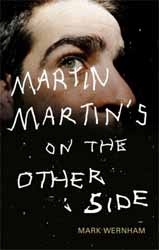|
Click here to return to the main site. Book Review
Jensen Interceptor is a middle ranking cog in the government machine when his big chance comes to shine as a spy. Sent to investigate Reg, an apparently nondescript low life who lives in North London, which is giving itself over to entropy and decay, Jensen soon discovers that not all is what it seems when he infiltrates the Martin Martinist cult - a cult based on a long dead television psychic who the cultists believe will return to Earth and make society better... Martin Martin on the Other Side is the debut novel by Mark Wernham. The first thing you notice about Martin Martin is that Wernham has obviously taken the course Dystopia’s 101. So our hero peppers his language with four letter words to indicate that things have changed - chavtastic - and not for the better. Though the use of expletives cannot replace the lyrical use of language that Anthony Burgess used in A Clockwork Orange, or the clever sociopolitical transformation of the language to eradicate dangerous concepts as the state had done in George Orwell's 1984. Although I couldn’t be asked to do a work count, you get the feeling that if all the swearing had been removed, a third of the book would disappear. In order to clarify matters Wernham borrows the idea of social stratification into specific categories which first raised its ugly literary head in Aldous Huxleys 1934 novel Brave New World, though the concept is a fairly old one for sociologists. Want further evidence that society has gone to pot? Well, how about the general access and use of pornography and its associated presumed misogyny which accompanies it, an idea which already seems over simplistic and exceptionally Victorian in its outlook. Last, but definitely not least, is our heroes’ prodigious drug taking. At the beginning of the book I was somewhat intrigued where Wernham was going with his hero; in all the previous aforementioned books even the most apparently irredeemable characters - that would have to be Alex from Clockwork - had elements which allowed the reader to either view their actions as either heroic, ironic, or in the case of Alex, they have aspects, such as a love of music which rounds them off, lending them an air of reality. Wernham however shows us a character with no apparent redeemable characteristics as he presents a foul mouthed misogynist with limited education, culture, or intelligence. I have to admit by the time I got to page twenty I wouldn’t have cared less if he had spontaneously exploded and the book had ended. That said, I am glad that I persevered with the book as once the plot kicks in things really do get interesting. Jensen’s experiences become truly surreal. He starts having out of body experiences, but is he truly meeting Martin Martin? Is he tripping or having a psychotic break? The unknown here injects a level of mystery that forces the reader to continue on with the narrative. Suddenly, you find yourself in a world made up of dead soldiers bent on revenge, a TV psychic who may or may not be the real thing, where the past and present become fluid and indistinguishable. I can’t help but feel that the unnecessary swearing - which whilst I understand is there to give Jensen his individual voice - comes over, for the most part, as filling and tends to spoil what is otherwise a novel that has a lot to offer. Wernham writes with a confidence which belies the fact that this is a first novel and so is well worth a look. You may disagree that Jensen’s use of language actually becomes a distraction and certainly, if they find it, it will no doubt become a favourite of adolescents. As a new novelist Wernham shows great promise, that’s not to say that the book does not have problems, but for the ideas alone it’s worth a read. 6 Charles Packer |
|---|

